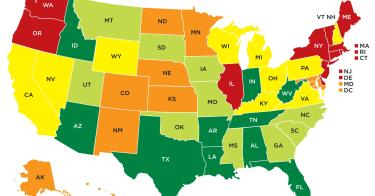My usual posture toward Alabama’s political class has been measured criticism, not out of malice, but from a sincere belief that Alabama possesses untapped greatness. Having long observed our considerable potential hemmed in by institutional timidity, I now find myself pleased to dispense praise where it is richly deserved.
The Heritage Foundation (my employer) has released its 2025 Education Freedom Report Card, finding that Alabama stands ninth among the 50 states, a welcome achievement following our legislature’s prudent passage of the CHOOSE Act.
Although we’ve fallen four spots from last year in the “education choice” category, remaining in the top 10 overall is impressive progress.
The CHOOSE Act establishes refundable tax credits in the form of education savings accounts (ESAs). The measure empowers Alabama families to direct their educational resources toward the schools and services that best meet their children’s needs, including tuition, fees, and other legitimate educational expenses at approved providers throughout the state.
>>> The Clumsy Crusade Against School Choice
This form of school choice returns educational decisions to parents rather than ceding them to bureaucracy. The Alabama Department of Revenue is tasked with creating the framework, but the ultimate authority rests where it belongs: with mothers and fathers who know their children better than any government functionary ever could.
Despite this accomplishment, we hold a more modest 21st position in the specific realm of educational choice, suggesting that our recent legislative triumph represents merely the opening movement of a longer symphony.
The path toward genuine educational freedom requires additional measures, including expanding participation in private education choice policies, allowing families to accumulate unspent ESA funds for future educational investments, and streamlining barriers to charter school development, among other initiatives. These reforms would not only improve our educational choice ranking but also maximize the value families derive from their ESA investments.
Alabama’s strongest showing comes in return on investment (ROI). According to the report, the state spends the eighth-least per pupil: $13,478 annually when adjusted for cost of living. This fiscal restraint reflects Alabama’s commendable tradition of budget discipline.
Despite ranking 43rd in spending and posting low marks in average math and reading scores on the Nation’s Report Card (NAEP), Alabama maintains a relatively high ratio of teachers to non-teaching staff. At the same time, the state’s unfunded teacher pension liability amounts to 8.2% of the state’s GDP, a significant burden for future budgets.
These pension obligations represent perhaps the greatest threat to Alabama’s long-term educational sustainability; they’re a ticking fiscal time bomb that will inevitably constrain future policy options if left unaddressed.
So how can Alabama climb even higher than its current No. 5 spot in ROI? The report offers a straightforward prescription: raise student achievement on the NAEP and bring down those pension liabilities. Both objectives require political courage: The first demands accountability measures that may prove unpopular with education establishment interests, while the second requires confronting the Retirement Systems of Alabama.
We hold a respectable 15th place in civic education, but our standing could be even stronger if our public colleges and universities took my advice and adopted the Classic Learning Test (CLT). Unlike the SAT and ACT, which have become increasingly politicized, the CLT emphasizes foundational knowledge and critical thinking skills that should form the bedrock of any serious education.
Alabama holds the number nine spot in two other categories: transparency and teacher freedom. In 2024, lawmakers mandated that public school districts post K–12 curriculum materials online. A year earlier, Gov. Kay Ivey signed a parental bill of rights affirming parents’ central role in directing their children’s education and requiring the government to use the least restrictive means when burdening that right.
While Alabama has not explicitly banned compelled speech in assignments tied to critical race theory, the State Board of Education adopted a resolution rejecting any doctrine that assigns guilt or blame based solely on race or sex.
On teacher freedom, Alabama earns mixed marks. Nineteen percent of teachers are alternatively certified, but the state still refuses to grant full reciprocity for out-of-state teachers. At the same time, it requires all educators to pass the Praxis exam (even if there’s a limited connection between the test and classroom effectiveness). These credentialing requirements, while well-intentioned, often serve as barriers to talented individuals who might otherwise enter the profession.
Alabama avoids some restrictions common in other states. For instance, only 11% of the state’s larger school districts employ chief diversity officers.
To build on its current standing, Alabama should reconsider full reciprocity for licensed teachers from other states. By reducing unnecessary barriers to teacher recruitment, Alabama could simultaneously improve teacher quality and address chronic staffing shortages in rural districts.
Here is the path forward: expand educational choice, tackle pension liabilities, eliminate bureaucratic barriers to teacher recruitment, and maintain our commitment to parental rights and curricular transparency. These approaches will not please every constituency, but they offer the best hope for making Alabama excellent.
A ninth-place finish is cause for measured satisfaction, not complacency. The real test lies ahead: whether we have the resolve to build upon this foundation and create an educational system worthy of our considerable promise. If that happens, the reward will be a legacy of learning that elevates both individual achievement and civic excellence for generations to come.
This piece originally appeared in 1819 News




